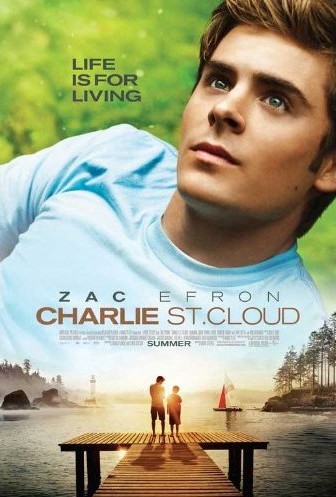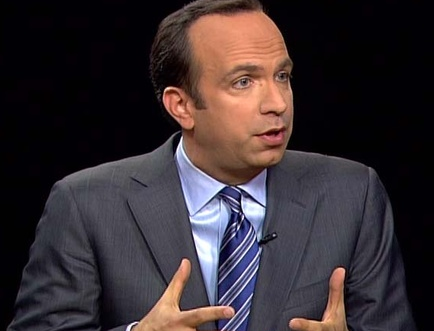Dour Troubadour Expresses Dismay Over Impending Nuptials Between Harlequin and Chanteuse
Dour Troubadour Expresses Dismay Over Impending Nuptials Between Harlequin and Chanteuse
“He swooned and sighed, ‘Oh, left hand third finger, don’t do it.’ It was just so eloquent and poetic and like one of his songs.”
-There is NOTHING about this article that doesn’t make me sad, and I’m sure it will give Awl pal Maura Johnston a continuing series of aneurysms, but here you go: Morrissey (yes, that one) has supposedly advised Russell Brand and Katy Perry against marrying. Also, Katy thinks Russ is too into Britpop. And a bunch of other stuff. At this point your best-case scenario for optimism is to hope that, like most of the stories in the British tabs, this is somehow made up.
How A Perfectly Normal Person Became a Right Wing Blog Pundit

Once upon a time I had some online friends and aquaintances, who were funny, smart, lively people. And then 9/11 “happened,” and some of these people changed. (Maybe some of you only know Jeff Jarvis as a media consultant and Google fan!) One of them was Michele Catalano. Today she describes what happened: “Something snapped. I was spending almost all my free time blogging. Blogging about war and terrorism and fear and death and sadness. A hatred welled up inside me. I knew what it was. I knew where the hate and blackness came from and what it was about. But in the post 9/11 world I found a convenient way to project all the bile without turning it back toward myself. I fell in step with the people who were known then as the warbloggers.” It was pretty amazing to watch, honestly! It felt like the world was turning inside out. The surprise ending is that humor writer Neal Pollack is the one who smacked her back to her senses, so, God bless. It’s stories like this, in part, that make me laugh at the people who are frothing about OMG MUSLIM GROUND ZERO MOSQUE-particularly since those people today who are screaming the loudest despise New York City at heart anyway.
Let's Meet 'Charlie St. Cloud' Author Ben Sherwood All Over Again
by Jordan Carr

If you’ve been out and about lately, or even if you’ve stayed in-you really can’t hide from this-you’ve probably noticed a media blitzkrieg for something called Charlie St. Cloud. But before it was a movie, it was a novel. Originally titled The Death and Life of Charlie St. Cloud, any copies you find of it now will likely be of the NOW A MAJOR MOTION PICTURE variety and have Zac Efron dreamboating the hell out of the cover.
That novel’s author is Ben Sherwood. He’s not an old man-only 46 now-but his fame and controversy extends back rather far, to his days as a Rhodes Scholar.
As his Wikipedia page put it-until as recently as July 9, when it went missing, although it remains on his Facebook page-”Sherwood’s years at Oxford were so controversial that he was profiled by Andrew Sullivan in a 1989 [actually, October 1988] Spy magazine article entitled “Resume Mucho” which described him as a child of privilege deeply disliked by his classmates.”
Following in his sister Elizabeth’s footsteps, the Sherwoods became the first brother-sister tandem to win the Rhodes scholarship.
As the Los Angeles Times put it back in 1986, “The Sherwoods’ remarkable story is not one of overcoming adversity.” Their father Richard was an influential attorney in Southern California. A quick search turns up Richard E. Sherwood Awards and Internships among other things.
On the Survivors Club website, which is a follow-up to a book of Sherwood’s of the same name, he answers the question of whether or not he is a survivor rather tepidly, concluding, “while I’m not a survivor in the direct sense, I’ve been a co-survivor many times.”
Andrew Sullivan’s Spy profile (only available here!) of Sherwood, a case study of “The Young Man They Call Mister Rhodes” is embedded in a longer article about Rhodes Scholars. Sullivan pulls no punches and one gets the distinct impression we are reading about a person Sullivan didn’t like who was representing an institution he didn’t respect.
Sullivan’s story is told as how Ben’s rise to young success was as preordained as these things can be-his grooming toward a more brilliant future allegedly beginning with the Sherwoods paying older children to play with their progeny so that they might become prematurely mature. Sherwood’s precocity was noticed elsewhere-a Los Angeles Times reporter who worked with Sherwood one summer described him as “a young man going on 65.” No Pam Laffin.

Ben went to the prestigious Harvard School (now Harvard-Westlake School) in Los Angeles for high school, and earned admittance into the even prestigiouser Harvard University, where his father attended law school. From day one there, by Sullivan’s account, he did everything he could to follow in his sister’s Rhodesian footsteps and made no secret of his intentions, perhaps grating on his contemporaries. One dismayed classmate summed up the reaction to Sherwood’s cynical social climbing landing him the Rhodes Scholarship, “People were dumbfounded…not simply because he got the Rhodes but because he planned and executed getting the Rhodes. He’d devoted his life to it. When he got it, we lost all hope.”
Sullivan appears to have found it alarmingly easy to find classmates to say mean things about Ben Sherwood. One recalled: “It was a common bond among my class at Harvard, hating Ben Sherwood.” Another: “Ben is one of the most hated people alive.” Another: “It’s bizarre. People actually make an effort to dislike him.” Another: “I remember people calling one another up when he got [the Rhodes Scholarship] and saying, ‘My God! There’s no justice in the world!’” One last one: “When you think Ben Sherwood, you think funny stories, you think asshole, you think ‘Thank God I’m not him.’”
According to Sullivan, the rugby team that he joined “to lock up my Rhodes,” only to never actually play in any games, “valued his contributions so much that at their annual cookout they chose to strip him nude and funnel beer down his throat-a ritual Ben apparently took as an affectionate form of hazing.”
The Sullivan profile does not let up in its portrayal of Sherwood as the ultimate entitled, résumé-building Rhodes mediocrity (the surrounding article is about how unimpressive the “Rhodies” as a whole are-and it concludes that Bill Clinton’s speech at the 1988 Democratic National Convention just goes to show that a Rhodie will never be President). Sullivan paints Sherwood’s trip to the Thai-Cambodian border as résumé padding that allowed him take a refugee-camp sign as a souvenir to be framed and put on his wall, his decision to take a year off as ducking a strong applicant for the Rhodes from his region. Sherwood comes off as a self-important, unapologetic, pompous jerk who feigned interest in causes to appear well rounded and worked family connections into internships at the Los Angeles Times and CBS, where he added Walter Cronkite and Dan Rather to his résumé as references.
* * *
“When I came back a lot of my friends looked at me and said, ‘Ben, What was it like being in Beverly Hills after having lived at Site 7 [on the Cambodia-Thailand border] for the better part of three months?’-this sprawling, steaming camp with 55,000 people in it who have nothing, just huts and people.
I had the distinct impression they expected me to come back from this experience and reject the country club and the house and the family and the servants and the Hollywood Bowl.
I could have done that. And it would have been outrageous and it would not have accomplished very much. You don’t have to reject Beverly Hills and Hillcrest Country Club to want to care about people elsewhere.
I am very aware of how privileged I am and how luck I am and when I look at poor people, I don’t feel guilty that I have what I have.”
That’s Ben Sherwood, at 22, in the Los Angeles Times article “Beverly Hills Siblings find the Rhodes Friendly on the Way to Oxford,” Feb. 16, 1986.
The only prior lengthy article about Sherwood was this profile of him and his sister (now on the National Security Council), and that is larded with enough of Ben’s own pontifications that it makes Sullivan’s point for him. Quotes like this:
I like to think that I’m controversial because I have opinions about things and I care passionately about certain things. And I think that sometimes it is not particularly popular to care passionately about gun control or current events,” and “I’m not reluctant to make waves when sitting at a dinner table with a group of classmates when one person says something I disagree with. And Machiavelli, who is widely misunderstood, said that in the long run it’s not that important to be popular because popularity is fleeting but respect is permanent.
Fresh off his Rhodes Scholarship, Ben Sherwood went into writing, working for a litany of publications and TV shows, making a few enemies along the way, and eventually writing novels The Man Who Ate the 747 (possibly to be a movie, and, yes, a musical) and The Death and Life of Charlie St. Cloud, and more recently that non-fiction book, The Survivors Club.
Benjamin Sherwood has made his own fortune from stories that emphasize the power of personal choice to overcome the kind of obstacles he never had-stories that take place in the small, isolated communities he never lived in. Say what you will, they do strike a nerve with people and are not at all successful by accident.
Sherwood has certainly capitalized on all of his advantages with hard work. None of this proves that Sullivan’s account was right-that Sherwood is a vacuous careerist with little more to him than whatever titles and achievements he can accumulate-but it doesn’t prove him wrong either.
Understudies!
Understudies! Diary of a Dancer Doing Two Shows of “Phantom of the Opera” On the Same Night at the Venetian in Vegas
by zorica

6:00 p.m. I start hair, makeup, and gossip procedures. The dance captain may or may not come in and tell me I missed my footlight in Hannibal last night. Guys, I really have no idea which one is my footlight. I’m supposed to count bulbs but I only remember that after I’ve already gotten too close to them to see them all.
6:30 p.m. The call over the PA is HALF-HOUR. I go do ab-work and a short barre in the warm-up room, then put on my wireless mike.
6:55 p.m. The call is FIVE MINUTES. I put on my Slave Girl costume.
6:59 p.m. The call is PLACES. This is also my personal call time in the wig room for my Slave Girl wig.
7:00 p.m. TOP OF THE SHOW. For most of the prologue I hang out in the stairwell, stretching and trying to visualize which one is my footlight. We have to be upstage in our places for Hannibal by the time the overture aka “the big music” begins.
7:08 p.m. I miss my footlight in the Hannibal dance.

7:10 p.m. Hannibal is our exposition scene where we introduce our characters to the audience and while they’re getting know us we are also getting to know them. Audiences have extremely different collective personalities. Some are smart, they follow the plot right away and have reactions to the interpersonal strife onstage which other nights falls flat while the house fills with the sound of brain-machinery gnashing inside a thousand-plus heads. Some audiences are warm, clapping longer and louder than we’re used to and swallowing up some important lines. I can tell a good audience by how they respond to the humor in Hannibal. If they get the subtle jokes but pass on the obvious one then they’re a little too “holier than thou” and we’re gonna have to work for it. If the subtle jokes go over their heads but they guffaw on the obvious joke then they’re gonna loooove the show no matter how much we screw up. If they respond to all the jokes with hearty laughter then they are probably drunk.
During most of this scene I’m sitting on the floor downstage, right next to the footlights. Our orchestra pit is small; the first row of seats is only a step or two away from me. It can be very difficult not to make eye contact with the people sitting there while I pretend to scour the theater for signs of the fiendish Phantom. Sometimes I can’t resist checking them out and the intensity with which they return my gaze still rouses me every time.

7:15 p.m. First quick change, from Slave Girl into Degas. I almost always forget to change from the emerald green panties to the white panties. My dresser thought this was hilarious the first time I did it. Now she routinely says, “Panties!” as soon as I get to her.
7:20 p.m. I get to whisper a joke to one of the other girls as part of the Degas dance/scene. When I can’t think of anything I just go with a string of unrelated obscenities.
7:30 p.m. Here begins our 20 minutes of downtime. I have been using this time to write letters full of wisdom, non sequiturs, and at least partially covered in sweat. If you want one send me your address.
7:47 p.m. I almost fall over putting on my Sylvan Glade tutu. I can never find the damn leghole in the panties with all of that skirt.
7:51 p.m. The actor who plays one of the managers says the line, “Maestro, the ballet! NOW!” and backstage we all say “LATER!” when he says “NOW!” because we are comedians.
7:55 p.m. Trickiest moment of the show for me, I have to start off moving stage left but somehow get all the way over to right-of-center in three counts.
7:58 p.m. I must remember not to back up, or I will fall in an open trap door.
8:00 p.m. Second quick change from Sylvan Glade into Masquerade.
8:08 p.m. All the other dancers are pre-set on a huge piece of scenery but as the Monkey I am in the “Little Band” with three of the singers, chilling in the wings. We sing a song the dance captain made up called “Courtney’s Twelve” that is supposed to help us know exactly when to go onstage, but mostly serves as a group-bonding butt-wiggle extravaganza before we almost miss our entrance because we’re shaking our booties.

8:10 p.m. Masquerade, my favorite dance. Hopefully I don’t eff it up.
8:15 p.m. Back in the dressing room for our final costume change. If it was the last show of the night I’d remove the pins of my hair prep through the mesh of my wig cap, and usually I start doing this before I realize we have a whole other show to do, and so then I have to re-prep my hair all over again so it stays flat under the wigs.
8:20 p.m. Get back into costume for Degas. Because we are about to be trapped up in a stairwell stage right with nothing to do and no way to get to the dressing room, I have learned to stow away a few letter-writing materials inside the bodice of my costume, underneath my tights.
8:22 p.m. Run onstage for Don Juan Panic, praying the letter-writing materials don’t start raining from underneath my skirt.
8:24 p.m. Start writing letters in the backstage right stairwell.
8:30 p.m. Scramble to the monitor to watch the conductor for offstage singing with the chorus. Feel embarrassed because the real singers can hear me miss the high notes.
8:33 p.m. SHOW CURTAIN Here ensues a ridiculous scramble to re-set the stage for bows. It’s as choreographed as any dance: let this person go in front of you, wait until that piece of scenery moves, then go to your mark. It is pitch dark and when I get halfway to my mark trap doors open on either side of my path to swallow up the candelabras. It makes me think of Indiana Jones, and so far my stomach has turned over every single time it happens. Gotta hustle into place, though, because as soon as those traps snap closed the curtain needs to open on the ballerina tableau.
8:34 p.m. Assuming whoever is playing the Phantom doesn’t let his ego get so over-sized that we actually spend the rest of our lives waiting for him to finish congratulating the audience on how well they are applauding him, we take our company bows.
8:35 p.m. FINAL CURTAIN
8:36 p.m. We run downstairs, pulling off our wigs and mikes as we run, unhooking our costumes so that when we hit the dressing room door we are almost entirely undressed.
8:37 p.m. Relaxation in the green room. Eating of yummy things. Taking care of company business like autographing posters to be auctioned for charity or discussing who is sleeping with who, provided that “who” and “who” are not present.
8:50 p.m. Wearing an ugly newsboy cap I found in the dressing room over my wig cap, sweatpants over my tights, and my dressing gown over my leotard I hack my way through the forest of tourists queueing up for our second show and purchase my second tea at Bouchon Bakery.
9:05 p.m. The call is HALF-HOUR for the second show. I write more letters, brush my teeth, and refresh my lipstick.
9:20 p.m. The call is FIFTEEN MINUTES and I think I will die if we don’t just get on with it already.
9:34 p.m. The call is PLACES. My hairdresser wants to know how my Slave Girl wig got so destroyed in the first show.
9:43 p.m. I miss my footlight in the Hannibal dance.
9:50 p.m. “PANTIES! For Christ’s sake.”
9:55 p.m. “I wanted to tell you a joke with the word ‘fart’ in it because ‘fart’ is a guaranteed laugh but then I forgot to think of one until right now so this is going to have to suffice for your joke tonight.”
10:05 p.m. p.m. “Dear friend, I’ve heard that Einstein once said that the definition of insanity is doing the same thing over and over again but expecting a different result. Well here I am doing the same thing over and over again and trying to get it to always be the same, but somehow it keeps being different …”
10:26 p.m. p.m. “Maestro, the ballet! NOW!” (“LATER!”)
10:33 p.m. p.m. Trapdoortrapdoortrapdoortrapdoor
10:43 p.m. p.m. “One and two, three four fi-ive and a six, seven-eight, nine-and-ten, and e-lev-en and a-twel-elve!” *booty shaking*
10:50 p.m. p.m. This time I really CAN take out my prep pins.
10:57 p.m. p.m. It’s really not very comfortable to run with paper and pen tucked in your tights.
11:08 p.m. p.m. SHOW CURTAIN; trap-door induced cold-sweat
11:09 p.m. p.m. GET OVER YOURSELF ALREADY, PHANTOM. (Although if I were the Phantom I’d probably milk it too.)
11:10 p.m. p.m. FINAL CURTAIN; nakedness; refreshingly cool makeup towelettes, hair unleashed and freely flowing; normal people clothes; laugh; sing; talk; leave.

Zorica is a ballet dancer living and dancing (and singing!) in Las Vegas, Nevada. She wears Freed pointe shoes, prefers Sleeping Beauty to Swan Lake, and plays beer pong Wednesday nights at Green Valley Ranch.
The Poetry Section: Anita Mohan
by Mark Bibbins, Editor

This week, two new poems from Anita Mohan.
suicide by homeopathy
we say homoios: or kind of kind
and patheia, meaning effect,
branched down from pathos.
a kind of sadness cured by a concoction
of sea shells-their white curves dip
into shade like a clavicle.
or the wet stir of bee pollen gathered
from a sun-quenched apiary
or indigo threshed from inky fields.
so, what would it mean, to extinguish existence
by inhaling odds and ends that exhale black ocean
on the breath, black dirt after a downpour,
that fresh sea garden gone bitter on the tongue?
or what would it mean to discover medicinal trails
of fungus in a parasitic Iceman?
what this dark vast pathos doesn’t intimate
is that he lies buried like treasure in Alpine Sugar
a kind of sleeping beauty.
one spring, the veins of the Iceman defrost,
run salty. his cells unhinge from their moorings
in that black ocean, by the sudden chemistry
of what’s in the blood.
no, everything is not going to be okay
tonight, our two paper starlings play on a stage
of paper, under a black type of rain,
their dialogue all strange incantation.
someone should warn them, don’t bind yourself
to a typewritten theater, because the effect
of scissor-cut speech is not akin
to a thunderous flap of wings knifing air.
to be okay, dart your beaks like quills ‘round kumquats,
warm as the curl of infants’ hands.
for if you starlings insist on making love-chatter
from pulp, your moon-drenched mouths
will run over with type, and know: everything
is not going to be okay.
Anita Mohan is a poet, fiction writer and litigator in the SF Bay Area. Her first book of poems is Letters to an Albatross, recently published by BlazeVOX books. She was the recipient of a Puffin Foundation, Ltd. grant in 2005.
You may contact the editor of The Poetry Section at poems@theawl.com.
Would you like to read more? Visit our vast archive of poetry!
Standard Procedure: Crossing the "Rubicon" at the Boom Boom Room
by Nate Freeman

“Rubicon,” the new AMC conspiracy theory show that celebrated its upcoming premiere with a party at The Standard Wednesday night, is named for the river in Italy that inspired the idiom “crossing the Rubicon”-as in, passing a point of no return. The phase refers to Caesar’s decision to lead his army across the river, which was equated with an act of war. And taking that elevator to The Top Of The Standard is something akin to that act-it is, in some respects, like passing a point of no return. But before we got to the Boom Boom Room there was the real reason for the event: a roundtable discussion about national intelligence and counter-terrorism-no dessert until you finish your vegetables, etc.
The attendees of the party-which was co-hosted by Vanity Fair-sauntered around the balcony outside The High Line Room, taking in the view of the Hudson snaking past the long line of sun-silhouetted monoliths. The attendees were cupping glasses of white wine, picking at small plates of salad and crumbly French cheese, and chatting up the cast members. Media consultant and entrepreneur Elizabeth Spiers had come because she was genuinely interested in the show-she said that she’s always had a secret desire to be involved with intelligence.
There was a scramble for seats-there were three empty toward the front, but they were all reserved for David Simon. On stage there was a silver-haired Bob Kerry, former senator and current New School president, in a canvas sport coat; Michael Sheehan, former deputy commissioner for counterterrorism and National Security Counsel; Jack Devine, former CIA chief of worldwide operations; and Henry Bromell, an executive producer of the show. Vanity Fair writer Rich Cohen moderated, and opened with an extended metaphor related to “Three Days of the Condor,” which, like “Rubicon,” takes place in lower Manhattan.
Then they showed clips from the show-there’s a code in the crossword puzzles!
Jack Devine held fast to the idea that there are no real conspiracies in his line of work. He said his job “doesn’t make for good movies,” which doesn’t exactly bode well for the future of “Rubicon.”
Then, someone asked the inevitable question about the U.S.’s support for Israel-this really riled up Bob Kerry, who talked until the organizers in the back were making helicopter signals to cut the talk off.
So, the Boom Boom Room, for the uninitiated, lived up to some of its rapturous hype-a sweeping gold-lit wooden centerpiece shot out of the bar, and everywhere guests walked in front of giant vistas of the glowing skyline. (This is true even though the nightlife at The Standard has been rebooted, as of last month, with the emphasis on “Le Bain” now. It has a pool and a hot tub.) The DJ spun some Talking Heads, and if you really wanted to, you could have convinced yourself that you had walked into “Bright Lights, Big City.” The new Studio 54, indeed. The party had filled out, as obviously many opted to skip the talk. The prime real estate, the couches by the windows, had been claimed. The Observer’s Max Abelson talked with us about that final question about Israel.
“It would be great to talk to that guy,” Max said, referring to the person who asked it.
We looked around for him. There was Mark Ruffalo, but he seemed in-and-out. Someone said they saw him earlier, downstairs getting a drink with Sienna Miller.
The balconies had a glass floor with a view that shot down to the tiny-looking taxicabs. What a vertigo-inducing place! Jessica Collins, who plays one of the female leads in “Rubicon,” came out. Her boyfriend was guessing where I went to school-first he looked at my tie and notepad and said “Ivy League,” and then Texas, and I told him somewhere between that. Then a couple of gatecrashers showed up. I commended the crashers for getting in, and told them to indulge in as much free drinks and things as possible.

Henry Bromell, the show’s executive producer, lamented that they had to film the next day at 8:30 in the morning. Will all this Moët et Chandon make for a cranky cast come tomorrow?
“They’ll be fine,” he said, and smiled.
And, wow, you’re on AMC. Is Rubicon going to maintain the hot streak they’ve had, what with “Mad Men” and “Breaking Bad?”
“That’s the goal,” Henry said. “It’s a high bar but it’s a goal.” Okay!
By the way, the bathrooms at the Top of the Standard are an easy pick for the Bathroom Hall of Fame-they’ve got floor-to-ceiling views of the city and stalls built from a series of sleek mirrors. It’s a level of opulence that seems excessive, especially given that the party is fêting a show about the gritty mean streets of lower Manhattan, where scrappy heroes eat from halal carts and dig for clues in shady basements and all that stuff.
I finally caught glimpse of James Badge Dale, the star of “Rubicon,” as he made his way to the door. His hair was slicked back and he had on a dark gray vest.
“I’m having a good time,” he said. “There are a lot of people who have put in long hard hours.”
He was now twisting his neck toward the exit, visibly anxious to get out. I asked about how he would weather the morning’s filming to come.
“I had one beer,” he said. “But have a drink for me!”
A Brief History of Kanye West's Twitter

So last night professional crazy person Kanye West opened up a Twitter account after performing a mysterious and confusing (but kind of awesome) a capella performance at Facebook HQ. If you were lucky enough to start following him last night you either stayed up late into the night waiting for his next insane, misspelled (but again kind of awesome) Tweet or awoke this morning to a torrent of craziness. So, without further introduction (or parentheses) here’s our guide for understanding the unhinged tweet-rantings of Kanye West.
“Up early in the morning taking meetings in Silicone Valley” 11:17 AM Jul 28th
And we’re off, word misspelled, but it’s not really too insane right?
“Lol I spelled Silicon wrong ( I guess I was still thinking about the other type of silicone ITS A PROCESS!! : )” 12:05 PM Jul 28th
Ok, that smiley is a bit strange, but nothing like his capslocked blog posts, maybe Kanye West has calmed down a bit. Who doesn’t get confused about the difference between silicon and silicone? He dates a lot of models.
Between 12:53 PM Jul 28th and about 22 hours ago West made shout outs to various celebrities like Jimmy Fallon and Perez Hilton, did a shoutout to Pitchfork, usual stuff. He tweets here and there about how cool twitter is; around yesterday afternoon it really looked like he was all better from the kooky thoughts that made him yell Taylor Swift and cry on television. Last night it looked like we were in the clear America-we got our college dropout back!
And then about 13 hours ago he started posting about goblets…
And he kept posting about goblets…

Oh, here’s another goblet picture…
And then after that, as the night rolled into the early morning he pretty much just stopped making any sense whatsoever.
About 13 hours ago he tweeted “I feel the glow” and from then on it was a mish-mash of insanity with tweets like “SWAGGER ON 200,000 THOUSAND TRILLION!!!” (I don’t think that’s a number…), “Dating models I had to learn to like small dogs and cigarettes,” “Classical music is tight yo,” “William Tell” Overture by Andre’ Rieu … Maybach music!!!,” and then about 2 hours ago West tweeted “I specifically ordered persian rugs with cherub imagery!!! What do I have to do to get a simple persian rug with cherub imagery uuuuugh.”
And then there’s this. Which we can get behind!
this J.Press tie is the greatest tie of all tiiiiiiiiiiiiiiiiiime!!!!!!!!! Kool Aid smile!!!! It’s the small things that mean so muchThu Jul 29 19:34:44 via web
Kanye West
kanyewest
So, there you have it, a simple and easy to follow timeline on the rising insanity of Kanye West’s twitter account. There’s probably a good chance it’s only going to get more insane from here, so be sure and start following him now, it can’t be long before he tops Hayley Williams and twitpics his penis wearing shutter shades “accidentally.”
Farewell, ASBO, You Were Too Gimmicky For This World
Sad news from Knifecrime Island, where the new government has decided to get rid of ASBOs-orders aimed at preventing people from anti-social behaviors by banning them from engaging in those behaviors. Home Secretary Theresa May characterized the Anti-Social Behaviour Orders, created over a decade ago by a previous Labour government, as a “’top-down, bureaucratic, gimmick-laden approach’ [which] had not worked and got in the way of police taking action against thugs. She also urged residents themselves to do more to stand up to thugs,” which is code in Britain for “Stick it to them before they stick it to you.” It, of course, is knives.
Real America: Your Civil Rights Sausage Is Made in Minnesota
by Abe Sauer

As we noted in our last look at some of the funding in the Minnesota governor’s race, Best Buy has joined with Target by donating $100,000 in cash to MN Forward, a PAC that supports Tom Emmer, the vehemently anti-gay rights GOP candidate for governor.
As Target’s PR woes roll on-the corporation seems deaf to public outrage, refuses to condemn Emmer and is taking on damage to its brand image (Target/MN Forward results are now on the first page of a Google search for “anti-gay corporation”)-one would be excused from speculating that Target CEO Gregg Steinhafel’s personal support for Emmer (thanks to moves like Emmer’s vote against a 2010 tax bill adding a fourth tier to state income tax) may be spilling over into his management of his corporation against its own best interests.
Reached for an update, we were told “Target’s support of the GLBT community is unwavering, and inclusiveness remains a core value of our company. Some current examples of that support include: Domestic Partner Benefits; Sponsorship of Twin Cities Pride; Sponsorship of Out & Equal Workplace Summit.” Also unwavering, their support of MN Forward and Tom Emmer.
Extending to Best Buy the same open opportunity to address consumers that given Target, we received the following statement, presented in full:
Best Buy’s political giving strategy — and its decision to support MN Forward —  is based solely on the need to help elect candidates who will make jobs and economic issues a top priority this election. As a business in an industry highly sensitive to consumer uncertainty, unemployment and market instability, a successful economic recovery is critical.
We sincerely appreciate and understand the concerns raised regarding the governor’s race. The reality is candidates across the political spectrum have a lot of different positions on a lot of different issues — and Best Buy may not necessarily agree with all those positions. But from a jobs and economic perspective, Best Buy joined other MN businesses in supporting the objectives of MN Forward. Consistent with Best Buy values, we also believe our employees, shareholders and customers have a right to know how Best Buy engages politically which is why we informed employees of the contribution and publicly post our political policy and annual activity report on www.bby.com/advocacy.
Please know that Best Buy remains completely committed to creating a diverse and inclusive workplace in which employees are encouraged to bring their whole self to work. For the past six years Best Buy has received a perfect 100% rating on the Human Rights Campaign’s Corporate Equality Index recognizing our commitment to GLBT workplace equality.  In addition, Best Buy supports policies and organizations committed to diversity and has worked closely with Best Buy PRIDE (our GLBT employee network) to support issues including working with the Human Rights Campaign and other businesses in advocating for the Employee Non-Discrimination Act (ENDA) .  Â
And we always encourage our employees to make their voices heard on issues and decisions that are important to them and give them the tools to do so. They have multiple channels to express their points of view — in person, via social media, etc. — and the ability to join in our grassroots political action work.
We also offered Best Buy the chance to publicly condemn Tom Emmer’s positions on gay rights and commit to suspending funding for MN Forward if it continued to support him. It did not respond.
Like Target, Best Buy has chosen to go the route of claiming a need to support the “pro-business” candidate, regardless of his other policies. Also like Target, Best Buy has made this claim while shielding itself with its perfect “100 percent” Human Rights Campaign Corporate Equality Index score.
But forget for a minute about human rights, and let’s just talk business.
When Target, Best Buy, MN Forward, Gregg Steinhafel, the GOP, the Tea Party and anyone else refer to a Republican candidate as “pro-business,” what they really mean is that he or she is for tax cuts. That’s it. If the economy boomed, Emmer’s proposal would be tax cuts; he doesn’t just have a hammer, he is one, and thusly looks at everything, including you, as a nail.
Much as it is with the “pro-life” movement, the “pro-business” nomenclature is a political slight of hand that frames any adversary of a “pro-business” candidate as “anti-business.” Some might not believe fully that Democratic candidate Margaret Anderson Kelliher’s plans to “grow” jobs in Minnesota are foolproof (including me), but are we really expected to believe, especially in this age with a moderate left just as in bed with corporations as the right, that she is against Minnesota businesses? The characterization is insulting.
Emmer is “pro-business.” He is just not “pro-Minnesota-business.” The cut of Emmer’s jib is to grow business as a whole by reducing taxes and, maybe not intentionally, join all the other states racing to the bottom where the sole means of competition is to give more and more away to corporations. Essentially, Emmer’s tax cuts to Target and Best Buy would result in other states without a Target and Best Buy cutting taxes even lower to attract them, consequently leading to the next election cycle when the “pro-business” candidate would have to advocate cutting taxes to attract Target and Best Buy. In this respect, Emmer’s tax gouging policies would create a very pro-business environment, it just might not be in Minnesota.
The kind of low-business tax climate states that Emmer would have Minnesota emulate include Texas, Utah, Wyoming, Tennessee, Missouri, Virginia, South Dakota, Wyoming, Florida, Mississippi and Oklahoma, all 11 of which finish in the top 20 in the Tax Foundation’s annual assessment of tax conditions. (Minnesota ranks a dismal 41.)
Big surprise that these same 11 make up more than half of the 20 states in America that offer no (zero) state-level protection for employees based on sexual orientation. This means that companies wallowing in low tax rates in those states can, without legal penalty, choose to not hire a person based solely on his or her sexual orientation. And not that those discriminated against would have a home to spend that paycheck on anyway; many of those same states allow landlords to evict or decline housing to gays. It’s a circumstance with which Awl readers are already familiar.
But, according to the Boardroom Intelligence report “Best States for Business,” tax climate isn’t the most important factor for attracting or keeping business. Despite having a tax climate ranking of 41, Minnesota ranks 18th most attractive, thanks to its high ratings in education and quality of life. Wyoming, number one for tax climate, ranks only two places higher than Minnesota. Circuit City, formerly headquartered in Virginia, a state with a Tax Foundation ranking 25 places higher than Minnesota’s, just got its last rites read to it last year by Minneapolis-based Best Buy.
Is Emmer suggesting Best Buy or Target, whose brand strength comes from their collection of creative talent, is going to flee to South Dakota and expect its diverse staff of creatives to relocate? In 2009, while entertaining cheaper offices, Target’s employees were vocally unhappy with the concept of even moving to the Brooklyn Park suburb of Minneapolis.
But Target and Best Buy have more than their support for MN Forward in common. Both companies are also leaning, hard, on their sparkling Human Rights Campaign Corporate Equality Index (CEI) records. How do you know the HRC is committed first and foremost to human rights? It’s in the title.
We reached out to HRC spokesman Michael Cole to see if Target and Best Buy’s recent political shenanigans might impact their spotless records.
Nope.
Cole told us, “It’s important to understand that the CEI is a measure of the workplace practices of a company toward its own LGBT employees. We don’t believe that rating companies based upon their political contributions is an accurate reflection of their commitment to LGBT equality in the workplace.” Further, Cole says, “Unless the contribution is to a ballot initiative that is anti-LGBT (such as California’s Prop. 8 in 2008), political contributions are not factored into a company’s score….”
When I ask if this means a corporation would not be dinged as long as its anti-gay rights money went through a PAC or intermediary, Cole says, “That’s not necessarily true,” explaining that ballot measures are a “different beast” than candidate election. The implication is that as long as a corporation’s money goes through a PAC-like intermediary, its CEI will not be dinged for donating to a candidate, regardless of how anti-gay he or she was.
This means Target or Best Buy would not lose their perfect ratings even if their money made it to, say, Oklahoma State Rep. Sally Kern, who has compared homosexuality to cancer and is on record saying homosexuality is “the biggest threat our nation has, even more so than terrorism or Islam.”
In the HRC’s CEI tally, a range of policies and practices can win a corporation points. For example, Target gets “+5” for making sexual orientation training required for all managers and supervisors. (A score of 100, which is what Target and Best Buy boast, is the highest possible.)
Yet, the last category taken into account on each company’s index is “Responsible Citizenship” where corporations can lose overall points for failing to be a “good corporate citizen.” HRC defines this category as “Employer exhibits responsible behavior toward the LGBT community; does not engage in action that would undermine LGBT equality. Employers found engaging in activities that would undermine LGBT equality will have 15 points removed from their scores.” (Emphasis, mine.)
Target is “-0.” Ditto Best Buy. By HRC’s own definition of its index, what exactly would qualify as “engaging in activities that would undermine LGBT equality” if not supporting candidate Tom Emmer, who wants a constitutional amendment against gay equality?
So, for their workplace treatment of a handful of employees, Target and Best Buy are gifted a 100 percent approval rating that those businesses can then use as a defense against giving hundreds of thousands of dollars to an anti-gay politician whose election could mean a rollback of rights for all. The takeaway here being, HRC’s CEI ratings are valuable for selfish individuals interested in how a corporation is going treat them, regardless of at what expense it is to others.
In a mind-bending display of working against its own interests, HRC’s statement on its effort to achieve gay marriage equality reads, “By supporting state leaders and mobilizing HRC’s members in support of marriage and relationship recognition initiatives across the country, tremendous gains have been made.” And yet, the organization continues to fully endorse corporations that are actively funding those who would make their jobs harder.
And here the reasoning in the fight over state taxes and gay rights begins to dovetail. Cratering state taxes, creating a nationwide sprint to the bottom, is not all that unlike rating a business solely for how it treats a few employees at the expense of the whole workforce.
Worse than shooting itself in the foot though, HRC has mired itself in PR relationship quicksand that threatens the good work it actually does. Target and Best Buy rely on HRC to legitimize them and in return they repeatedly cite HRC’s endorsement, thus legitimizing its rankings in the national media.
In his reply to us about not allowing Target or Best Buy’s donations to an anti-gay rights candidate reflect in their CEI ratings, Cole goes so far as the commend corporate America for not being more anti-gay, saying, “In fact, corporate America is leading the way on issues of equality: over 85% of Fortune 500 companies prohibit discrimination on the basis of sexual orientation….”
Of course, others may rephrase that corporate “leadership” as “a significant percentage of corporate America is completely fine with discriminating on the basis of sexual orientation.” The glass is half full; the glass is half empty (but if you’re gay and it’s empty, tough luck).
The conflicts of interest in HRC’s index are glaring. HRC relies on funding from the same corporate environment it supposedly rates. Though HRC won’t be removing points from Target’s perfect CEI score, it probably hopes the corporation will continue funding HRC’s Twin Cities dinner event as well as other HRC activities. The spokesperson we asked implied that HRC needn’t worry about their corporate patronage, saying “We are strongly committed to our support for HRC.”
By not dinging Target and Best Buy, HRC’s CEI ratings are so compromised and meaningless that they can be quoted in Target CEO Gregg Steinhafel’s personal statement to employees with the pronoun “our,” even as he personally maxes out his donations to Tom Emmer and Michele Bachmann, maybe the most anti-gay mainstream duo of candidates Minnesota has ever seen.
Showing that the HRC PR room is already comprised intellectually, Cole trumpeted Best Buy and Target corpospeak in his response to us by referring to the MN Forward PAC as an “independent expenditure committee.” Target and Best Buy’s statements have consistently suggested same, implying that MN Forward is some kind of third party organization. To suggest that MN Forward, helmed by the former right hand of possible Republican candidate for President Tim Pawlenty, has some kind bipartisan agenda proves outright that all of these groups assume you are stupid.
In the end, after any consumer outrage is burned off, a vote will be the final “index.” Those who truly want to punish Target and Best Buy will not forget in November to vote against Tom Emmer. The result of an Emmer loss will be two corporations who tarnished their reputations and their brands by unapologetically associating with a bigot, and a human rights organization that defended them doing it, all for nothing. “Business interests” indeed.
The increasing number of players in the Minnesota affair who shrug their shoulders over the civil rights issue of our time and claim “economics” should take a moment to ponder their legacies in light of the recently deceased Robert Byrd. On Byrd’s passing, everyone applauded the senator for his track record of economic contribution to his state, though it was largely pork. His highways will crumble and his coast guard station will shutter and his legacy will always be as a senator who insisted black people were lesser human beings. “Pro-business” candidates who are actively against gay rights, and those who support them, would be wise to pause and consider how they want to remember their actions during this time. Their grandchildren will have to say, defending them, “Yeah, but that’s just how everyone thought then.” And we will find out if the Supreme Court is correct; if corporations are persons, they should be capable of feeling the shame years from now.
Abe Sauer is watching where he shops.
Understudies! Musicals in the New Dark Age of Digital Reproduction: No Homo
Understudies! Musicals in the New Dark Age of Digital Reproduction: No Homo
Concurrent to the increasing visibility of non-heterosexuals in mainstream awareness over the past several decades has been an expansion and calcification of masculine and feminine stereotypes. These stereotypes manifest as a kind of shorthand for homosexuality, not only in everyday conversation, but also in movies and television shows in which characters are depicted as gay not by engaging in homosexual sexiness (which is still largely taboo), but rather by engaging in activities that have become increasingly and inexorably linked to homosexuality. A century ago, such activities (in the case of men) typically involved fashion-e.g., dressing a bit too stylishly-or a more-than-passing interest in interior decorating, table setting, flower arrangements, or any of the so-called “women’s arts.”
In the present post-war era-a period that can be referred to as the New Dark Age, or like the first Dark Age, a period of intellectual deterioration and religious authority-the range of activity commonly perceived as womanish or effeminate (and thus “gay” when practiced by men) now includes skipping, badminton, shopping, the affectionate ownership of cats and small dogs, all poetry, whispering (not to mention humming and whistling), the use of adverbs-he claimed didactically-any kind of dance not explicitly depicting intercourse between a man and his “ho,” the expression of doubt, ambivalence, or ambiguity, the strategic development of a “finesse” style of play in the game of soccer (see, e.g., the most recent German team), the cultivation of ferns and any flowering plant (especially orchids and lilies), the study of foreign languages (particularly French), and the reading of prose (especially novels) written by anyone but a heterosexual male.
Since the dawn of the New Dark Age, it is the musical, more than any other art form, that has shifted from a position of sexual neutrality to one of (perceived) homosexuality. In 2010, we understand that to see a boy or man singing a show tune means that he’s gay, and for this reason to be mocked, pitied or despised, not only because he’s gay (and for extra laughs, often made to seem oblivious of the fact), but also because he’s the worst kind of gay, i.e., an effeminate male unable (most often) or unwilling (less frequent) “to pass” for a heterosexual.
In the first half of the twentieth century, Broadway (and later, Hollywood) musical numbers-written by (to name just a few) Irving Berlin, George and Ira Gershwin, Eubie Blake, Leonard Bernstein, Richard Rogers, Lorenz Hart, Oscar Hammerstein, Dorothy Fields and performed by anyone from Mary Martin to Eddie Cantor to Frank Sinatra (and a zillion others)-regularly became popular radio hits, which meant that musicals transcended any kind of sexual/gender ghetto, i.e., these songs were not (yet) considered “gay.” (Let’s not pretend that today’s average broseph would declare these songs anything but gay.) Although an exploration of the many reasons for this transition (e.g., the rise of rock, the “sexual revolution,” technological advances in warfare, the advent of lo-fi buzzbands and “bloggable memes,” etc.) are beyond the scope of this piece, the most important factor in the now-widespread tendency to label musicals as “gay” is rooted in the same ground as the misogynistic impulse to dismiss any art widely understood to be artificial, frivolous, flamboyant, or melodramatic, all charges that, not coincidentally, are regularly used to dismiss women as unserious, unimportant, and inferior.
As an art form, the musical is inherently artificial, to the extent that (regrettably) we don’t find people singing to each other In Real Life. Unlike watching a movie or television, there’s no sense that audience members are seeing life as it unfolds (or ever could unfold). Many great musicals feature ornate costumes and choreographed dance numbers that have nothing to do with the Real World and are unapologetically Over The Top. Most important, musicals are emotional; it’s impossible to tell a story with music, whether a tragedy or a comedy, without at some point unveiling a character’s inner feelings. Hence the appeal to the gays, the majority of whom have spent years and often decades hiding emotions and thus find it quite “liberating” to see others profess their inner selves with naked abandon (even in a superficially heterosexual context, which is the case in the vast majority of Broadway/Hollywood musicals). Audience members are led to understand what it’s like to fall in and out of love, to be wounded or jilted, to crave or despise or to hate by characters gripped so strongly by emotion that they are compelled to sing (which for trained singers, not incidentally, is an action not too far removed from screaming or yelling, or two of the most unhinged emotions in the spectrum).
The implications of this transition do not threaten the existence of the musical; although musicals lack the mainstream appeal of fifty-to-eighty years ago, they are obviously still being produced (sometimes at great profit) and enjoyed by women, gays and heterosexual men who are either 1) dragged to the theater by their girlfriends or wives, or 2) secure enough in their sexual identities not to be bothered by the cocksucking allegations that will inevitably be levied against them.
More problematic in the larger scheme of our society as it stumbles forward in the New Dark Age is the increasing tendency of those who profess to hate musicals to actively denigrate the form in a manner that unconsciously betrays their own discomfort with a world that does not conform to their stereotypically defined view of what’s masculine (and thus worthy of praise) and what’s not (and thus worthy of denigration). For such people, it’s not enough to ignore musicals, they must explain with great virulence just how much they don’t understand the appeal, in the same tone of wounded, confounded misery we regularly hear from non-homosexuals trying to publicly decipher why anyone would choose to engage in gay sex. They act as though creativity (like sex) is a limited resource, and what’s devoted to one art form necessarily deprives them of another.
Whether this culture of denigration has had a chilling or censorious effect on art is debatable, but I find it difficult not to believe that large and lamentable numbers (particularly among adolescents) who, in fear of being labeled effeminate by their peers, are regularly steering themselves away from art forms in which they might otherwise have a talent or interest. (So the world becomes a colder and more barren place.) As the range of what qualifies as Suitably Masculine Behavior continues to narrow, men are left with fewer options to express themselves in ways that are not considered weak, womanish, or gay. Some options include 1) Business and Making Money, 2) Fucking Women, 3) Team Sports Unsullied by Openly Non-Heterosexual Players, and 4) Killing People with Knives, Guns and Explosive Devices, and 5) Art Depicting any of These. (Movement outside of these parameters is sometimes permissible if accompanied by a “no-homo” pass.)
The implications of this ethos are far-reaching, demoralizing and possibly frightening, not just for those of us who try to place ourselves outside of it. The cackling hyenas and self-proclaimed assholes who mock and deride the frivolous, the emotional, and the effeminate will have only themselves to blame when they find themselves at the receiving end of a bullet (real or symbolic) as the pool of those with power becomes increasingly confined in terms of both numbers and acceptable (i.e., masculine) behavior.
Matthew Gallaway is a writer who lives in Washington Heights. This is where you can learn about The Metropolis Case, his first novel.
